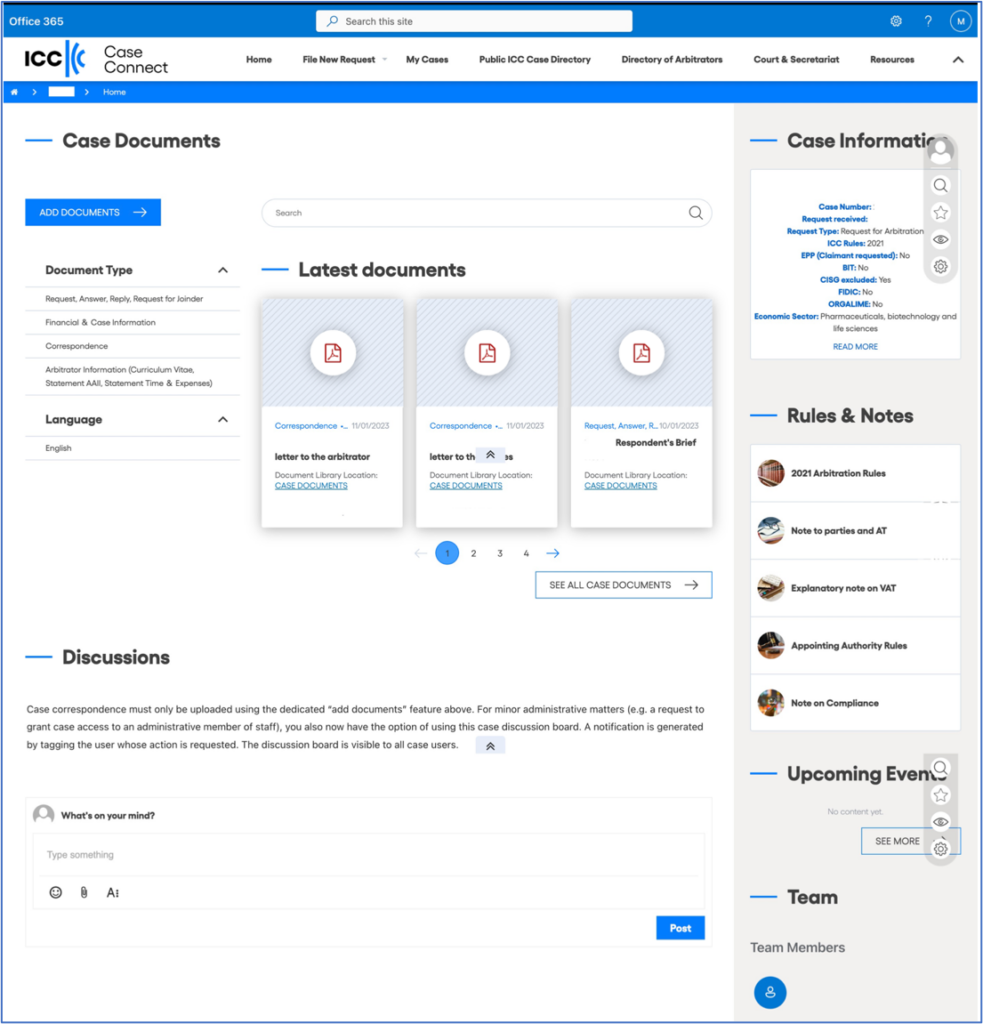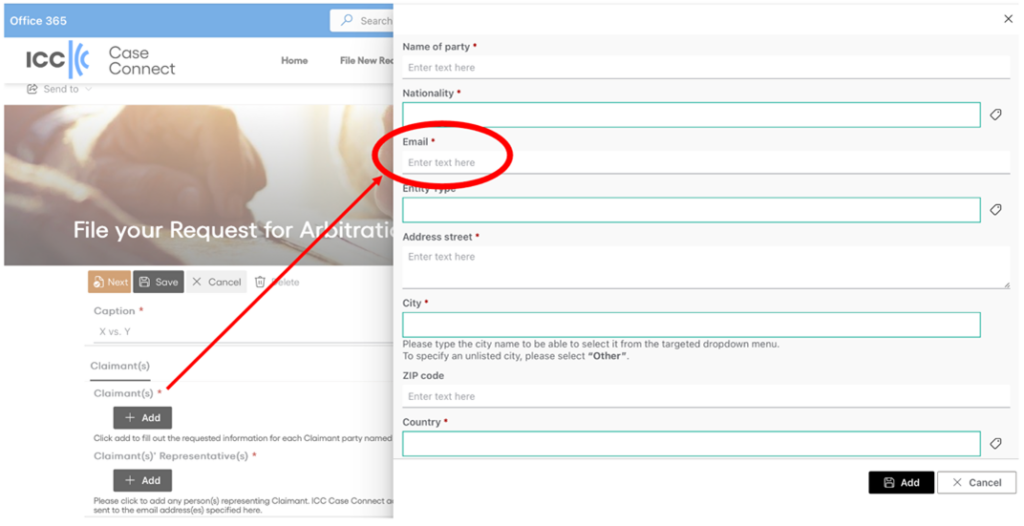In October 2022, the ICC launched its new digital case management platform, ICC Case Connect. Although not mandatory, parties are encouraged to use this new system, which is touted as a platform that “facilitates communication and document-sharing and offers a secure, dedicated, online space in which all case documents and information are centralised and easily accessible to all case users.” The ICC explains that users of the ICC Case Connect platform can expect to (1) e-file their Request for Arbitration (“RfA”), (2) upload, search, and filter documents, (3) access their case and document library, (4) communicate with all case users, and (5) consult the arbitrator directory. According to the ICC, ICC Case Connect will obviate the inconvenience of traditional hard copy delivery, oversized email attachments and the concerns of using file sharing sites.
This is not the ICC’s first foray into digital case management. In 2005, the ICC launched NetCase, which was intended to address what the ICC had identified as users’ primary concern – having a secure central document repository. NetCase did not include the ability to e-file the arbitration and could only be used (after the Tribunal was constituted) if all parties and arbitrators agreed. It was, however, well-received by those parties that did use the platform.
Additionally, the ICC is not the first arbitral institution to implement a digital case management platform. Indeed, in 2019 the SCC unveiled the “SCC Platform”, which “allows parties, agents and arbitrators to communicate safely and effectively and upload, share and print case materials, such as procedural decisions, pleadings and evidence, on an ongoing basis.” In 2021, the HKIAC also launched the “HKIAC Case Connect” an online case management platform which “serves as a repository to which all documents may be uploaded” and which parties can use to communicate and “track deadlines and dates on a case-specific calendar”. Similarly, AAA offers its “WebFile” platform to its users, which includes the same features as ICC Case Connect as well as additional features such as the option to pay invoices online.
To date, while there has been much reported on the launch of the ICC Case Connect platform (see, e.g., here and here), the authors were unable to identify any publication regarding user experience. Having now used the ICC Case Connect system to file a new RfA, the authors provide the following description of their initial experience, practical tips and overall first impressions to assist practitioners with transitioning into the future of international commercial arbitration.
Overview of the Case Connect Platform
While not the first digital case platform, ICC Case Connect is a welcomed step forward for arbitrations administered by the ICC. The website is well-designed and generally user-friendly. A searchable central repository of all case documents is a particularly nice feature.
Following submission of a RfA, each authorized user has access to the “dedicated case space” (i.e., a dashboard), shown in the image immediately below. This dashboard includes access to every document submitted in the case, can be filtered by document type (e.g., formal submissions, financial, correspondence), and the repository is full-text searchable. Any correspondence communicated by email or hard copy and copied to the Secretariat, will be included in the document repository by the case management team. When uploading documents directly, the user is instructed to upload documents according to their “Document Type.” The document retains the file name you assign, so simple descriptive names are helpful.
Being able to submit documents of any file size and to access and download them as needed, is a welcome addition and should significantly increase the overall efficiency of the arbitral process while avoiding the risks associated with unverified FTP sites or the hassle and confusion of multiple emails.
The dashboard also includes a discussion board. This is intended for “minor administrative matters (e.g., a request to grant case access to an administrative member of staff).” Discussion posts are visible to all case users.
Under previous ICC practice, parties’ counsel would be notified by email from the Secretariat, often with an attached letter, as to the current status or a procedural event. With ICC Case Connect, identified counsel will receive an email from the “ICA Case Management Team” informing them each time a new document is uploaded to ICC Case Connect, including a link to access the dashboard, where copies of all documents can be easily downloaded.
Filing Your Request for Arbitration Using ICC Case Connect
Not long ago, the standard method of filing a RfA involved sending copies of the request and associated documents by courier. The pandemic helped expedite the transition (already well underway) to “e-filing”, meaning that documents that previously would have been submitted by courier could, in some cases, be transmitted via email. The ICC Case Connect platform goes well beyond “e-filing” and provides a fully immersive and user-friendly case management environment. The ICC has provided a helpful video on how to file your RfA through ICC Case Connect. The following guide is intended to assist practitioners in overcoming any possible hesitance to diving into this brave new world.
The first step in the process is to access the ICC Case Connect platform on the ICC website. Clicking the “File your Request for Arbitration” link takes you to a Microsoft interface, where you will sign up for an account to use the platform:
Practice Tip on Initial Access: If you have more than one Microsoft account, make sure you are signed into the Microsoft account you intend to use for your case.
Practice Tip on Initial Access: This account will be used to file the RfA and provide initial contact information, including claimant’s representatives (counsel and any corporate). This account can be a firm or individual account. Additional users can be added by request to the case management team. There does not appear to be any practical limit on how many individuals can be provided access.
After submitting this form, you will receive an email from “Request for Arbitration & Appointment” (rfa@iccwbo.org), prompting you to click the provided link to begin registration:
The platform then prompts you to sign into your existing Microsoft account or sign up for a new account if you do not already have one. Once signed in you will be prompted through a series of four pages in order to file your RfA.
Practice Tip on Filing the RfA: Be patient. Do not be surprised if it appears that the form is having trouble loading or is reloading multiple times. In our experience, this occurred each time this page was accessed. Allow the webpage to cycle through and wait until the “File your Request for Arbitration” form has fully loaded.
Each of the pages has fields for information included in the RfA (see Article 4 of the ICC Rules of Arbitration) including, for example, the arbitration seat, the language of the arbitration, governing law and the full text of the arbitration agreement(s). Thus, having your RfA accessible is strongly recommended. In addition to identifying legal representatives, corporate representatives can also be identified. It does seem that this step could be facilitated by scanning this information to pre-populate the corresponding fields; however, given that there is currently no standardized form or format for the RfA, it is likely simpler to manually input this information.
You will also need to indicate the method of service required by the applicable agreement. If the parties have agreed to electronic service/notification, one only needs to provide the email addresses to be notified. If not, any specific method of notification can be requested in the last step in a field identified as “Comments for the Attention of the Secretariat”, including advising if hard copies have been transmitted.
Practice Tip on Filing the RfA: All required fields on a page must be completed before you can move on to the next page and/or save your progress.
Practice Tip on Entry of Claimant’s Information: You will be required to include an email for each claimant party (see annotated image below). In our experience, the email you provide will not be notified or copied on any communications. If you wish to give a corporate representative access to the platform, you must enter her/him as a “Claimant’s Representative”.
You will also be prompted to upload electronic copies of the RfA, the contract(s) giving rise to the dispute, other relevant annexes and proof of filing fee payment (if available). These and all other uploaded documents will be available to users going forward.
Practice Tip on Proof of Payment: Because the ICC invites the claimant to submit proof of payment with filing your Request, it is best for the claimant to submit the filing fee before submitting the RfA. If the fee has not yet been paid, the RfA can still be submitted; however, the ICC will not take further action until payment is received.
After the RfA is submitted, the identified claimant representatives will receive an email confirming successful submission of the request (which in turn allows them to register for access). You can also download a summary report of your RfA from the ICC Case Connect platform.
Practice Tip on Changes to Case Information: After your RfA is filed you will be able to upload additional files or documents; however, you cannot edit the “Case Information”. Any requests to change the “Case Information” must be communicated to the assigned case management team.
Following the submission of the RfA, the ICC will notify the respondent of the RfA. Any individuals identified in the RfA as respondent’s representatives will receive an ICC Case Connect platform notification inviting them to access their dedicated case space. Others, including counsel, will need to contact the designated case management team to receive access.
Overall Perspective
After using ICC Case Connect platform to file a new RfA, the authors are of the view that the system achieves the ICC’s stated goals of providing a facile method of e-filing and a searchable centralized document storage and retrieval system.
The ICC indicates that the ICC Case Connect platform will increase operational efficiency through swift and user-friendly document sharing and by introducing time-saving online forms for arbitrators. While it will take some time to see if these benefits come to fruition, from the structure of the database input and the initial documents we have received since submitting our RfA, it appears that the platform has been effectively implemented.
While there are additional features that could be implemented such as the inclusion of a centralized docket and the ability to make online payments, the ICC should be commended for its efforts to date.
Further posts in our Arbitration Tech Toolbox series can be found here.
The content of this post is intended for educational and general information. It is not intended for any promotional purposes. Kluwer Arbitration Blog, the Editorial Board, and this post’s authors make no representation or warranty of any kind, express or implied, regarding the accuracy or completeness of any information in this post.
________________________
To make sure you do not miss out on regular updates from the Kluwer Arbitration Blog, please subscribe here. To submit a proposal for a blog post, please consult our Editorial Guidelines.







